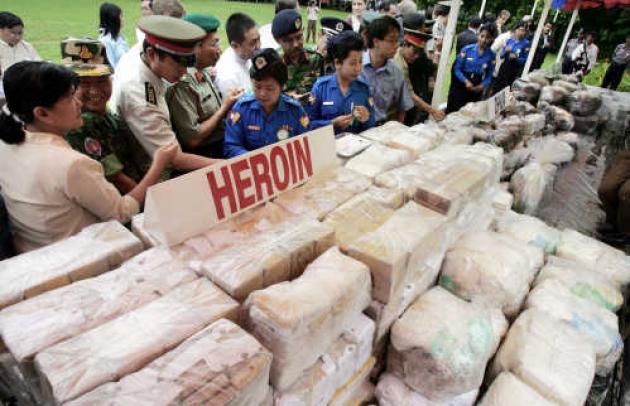Landmark drug deal

Following a year of negotiations, the Myanmar government and the United Nations Office on Drugs and Crimes (UNODC) today signed a landmark agreement binding both sides to greater collaboration.
While Myanmar has witnessed an increasing number of drug-related crimes and drug users, the country is now the world’s second biggest opium producer and the largest producer of synthetic drugs in Southeast Asia.
"Criminal activity in Myanmar is undermining development efforts, increasing human insecurity and threatening the peace process,” stressed UNODC Regional Representative Jeremy Douglas at the signing ceremony. “By working together to improve law enforcement and criminal justice capacity, increase the availability of quality health services for drug users, and offering sustainable economic alternatives for opium farmers and their families, we will be contributing to the economic and social development of the country.”
With the Ministry of Planning, Douglas, in charge of Southeast and the Pacific, signed the integrated Country Programme for 2014-2017, agreeing to collaborate together to strengthen the rule law and address significant crime and drug issues. The agreement was approved by President Thein Sein and the Cabinet.
The Country Programme comes at a critical time. Drug trafficking routes which cross isolated border areas to move drugs to markets outside the country are used in reverse to smuggle precursor chemicals in. Porous borders are also vulnerable to migrant smuggling and human, wildlife and timber trafficking. The significant financial proceeds generated by different forms of trafficking in Myanmar are laundered and distort the legitimate economy, corrupt public officials, and undermine stability.
“Joined up with the Regional Programme for Southeast Asia we will also be assisting Myanmar to engage more fully with neighbouring countries. Many criminal activities that impact Myanmar are transnational in nature and require multi state solutions,” Douglas added.
The programme is broken into five sub-programmes, to deal with transnational organised crime; anti-corruption; criminal justice; drugs and health; and alternative development for opium poppy farmers. A joint UNODC-Government of Myanmar Programme Governance Committee is being established.
Late June, the government destroyed US$138.17 million worth of drugs to mark the UN's "International Day against Drug Abuse and Illicit Traffficking".
Upper House MP Khat Htein Nan said recently that after 1996, the problem of amphetamine and other illicit drugs became prominent. The issues of drug abuse and trafficking increased accordingly.
He noted that Myanmar’s opium production increased to 870 tonnes last year, rising from 690 tonnes in 2012, as cultivation areas were extended from 51,000 to 57,8000 hectares. So far this year, the country seized drugs worth US$130.94 million, nearly doubling from $76 million in the same period last year. Of total, drugs worth $88.09 million were seized in Shan and Kayah states.
From last year to February, the country busted 7,137 drug users, including 1,366 who were arrested in the first two months of this year.
He called for increased cooperation with international organisations to root out illicit drugs and trafficking.
“There are many drug victims in Kachin State where I live. Many of them are even living near my neighbourhood. To deal with illicit drugs, the opium cultivation must be eradicated,” said the MP.
Transnational Institute, a European non-governmental organisation, warned its recently released report that Myanmar's production of opium is the highest in Southeast Asia and accounts for about one-quarter of global output. Only Afghanistan produces more opium than Myanmar. Efforts to curb illegal drug production, distribution and use in Southeast Asia have failed, and the area known globally as the Golden Triangle has seen opium cultivation more than double since 2006.
Myanmar is also seeing an increase in the number of drug users, and they are switching from smoking opium to injecting heroin.
The surge in injecting drug users could fuel and expansion of the HIV/AidsS epidemic in Myanmar where "infection rates among drug users are among the highest in the world", the report says. "There is an urgent need to scale up quality prevention, treatment and harm reduction services for drug users and people living with HIV," says the report called "Bouncing Back: Relapse in the Golden Triangle".
UNODC’s Douglas believed that the new relationship would help.
This “will contribute towards a safer and more stable community, and increase the confidence of the citizens of Myanmar to look to the criminal justice system to provide stability and access to justice,” he said.
RELATED
